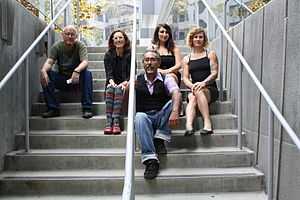Ricardo Dominguez (professor)
Ricardo Dominguez (born 1959) is an American artist and associate professor of visual arts at UC San Diego. He has been the subject of controversy over a number of acts of electronic civil disobedience on his own and with the Electronic Disturbance Theater, which he co-founded.[1]

Dominguez, the founder of the Electronic Disturbance Theater, has organized "virtual sit-ins" that attempted to overload and crash websites,[2][3] for which he and his co-founder developed a program called FloodNet that automatically requests the target page over and over. These events sometimes incorporated a search term, such that the search would return a phrase like "Transparency not found" in the University of California, San Diego website, or "human rights not found" at the website of Mexican President Ernesto Zedillo.[1][4] On one occasion, the United States Department of Defense diverted a planned attack to a nonexistent website.[4] One goal of the movement is solidarity with Zapatista communities in Chiapas, Mexico.
Dominguez also helped develop a phone app called the Transborder Immigrant Tool (TBT), which would use GPS technology to help immigrants find water stations in the Southern California desert and which also includes a poetry feature.[1][4] It also raises awareness about the number of people who die in the U.S.-Mexico border region and aims to rethink the ways in which "immigrants are always presented as less-than-human and certainly not part of a community which is establishing and inventing new forms of life."[5] TBT was subject to considerable controversy initiated by three Republican California congressmen; ultimately the University of California stated that TBT did not misuse research funds, but would not comment on whether it had broken any laws.
In an interview, Dominguez reports that his work, along with that of the Electronic Disturbance Theater, "has been to develop works that can create a performative matrix that activate and take a measure of the current conditions and intensities of power/s, communities and their anxieties or resistances."[5]
References
- ↑ 1.0 1.1 1.2 Goldstein, Evan R. (October 3, 2010). "Digitally Incorrect". Chronicle of Higher Education.
- ↑ Goodin, Dan (April 9, 2010). "'Virtual sit-in' tests line between DDoS and free speech". The Register.
- ↑ Harmon, Amy (October 31, 1998). "'Hacktivists' of All Persuasions Take Their Struggle to the Web". The New York Times.
- ↑ 4.0 4.1 4.2 Marosi, Richard (May 7, 2010). "UC San Diego professor who studies disobedience gains followers -- and investigators". Los Angeles Times.
- ↑ 5.0 5.1 Global Positioning: An Interview with Ricardo Dominguez http://www.furtherfield.org/features/global-positioning-interview-ricardo-dominguez
External links
- Interview with Ricardo Dominguez, Reclamations Blog